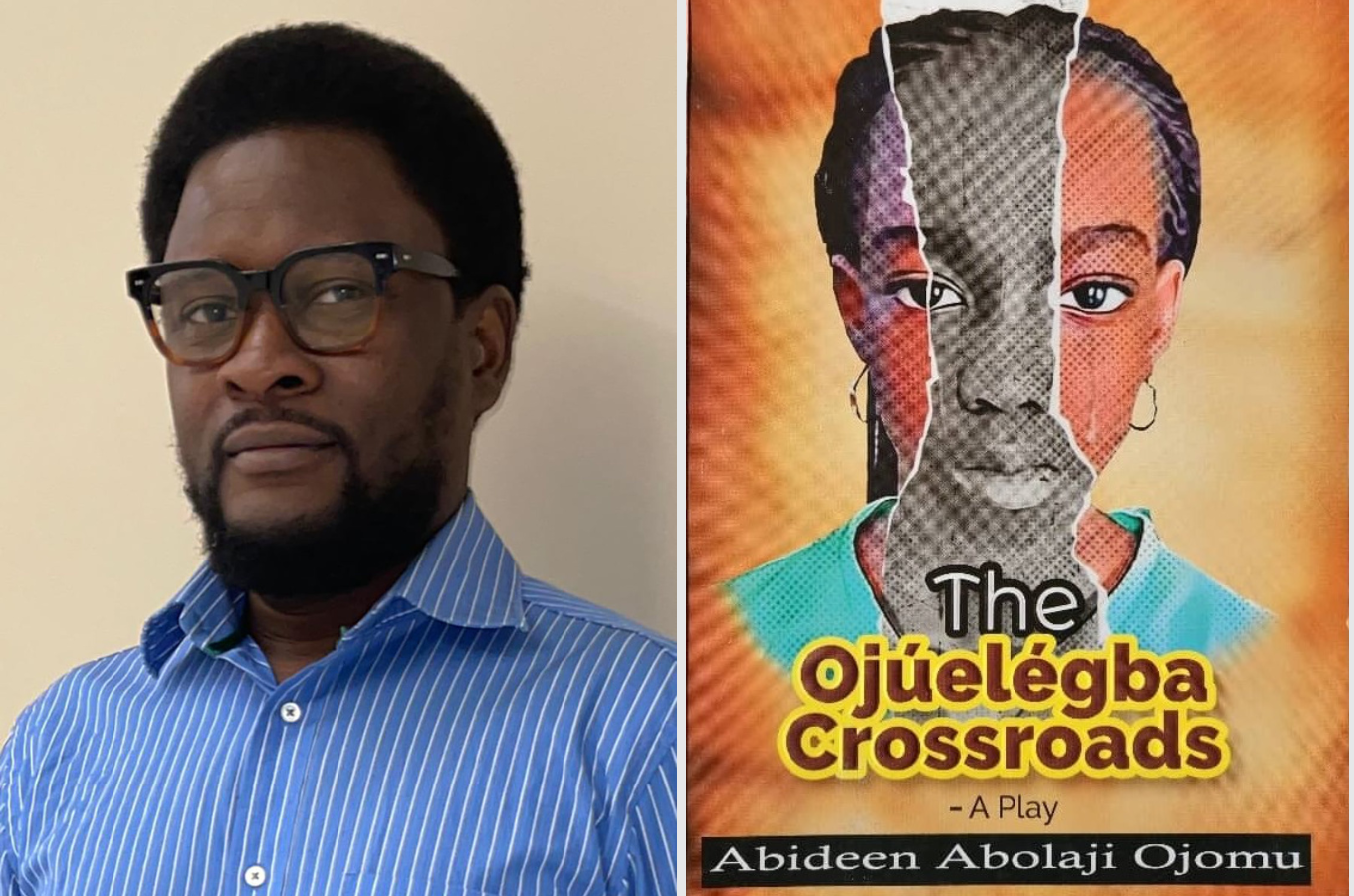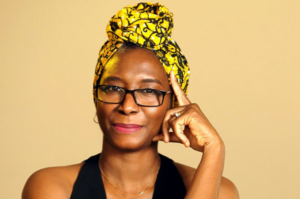
Abideen Abolaji Ojomu’s play The Ojúelégba Crossroads, which dramatizes some of the existential challenges that confront postcolonial nations, was recently shortlisted for the 2023 NLNG Nigeria Prize for Literature. In this conversation, Darlington Chibueze Anuonye chats with Ojomu on the inspiration and aspiration of his shortlisted book.
The play, which is set a fictional society that nevertheless resembles Nigeria in its social restiveness, parades characters who are dissatisfied with the political arrangement of their nation, but whose resolve to enact social justice are complicated by the compulsions of private desires and opposed by the same tyrannical forces they confront. What remains, in the end, is the scathing image of a broken socialist movement compromised from the inside.
Ojomu is a versatile Nigerian artist known for his work as a playwright, poet, actor, and dancer. He has staged numerous plays and participated in various book readings. His other works include Oils Wheels and Woes of Warriors.
***
Darlington Chibueze Anuonye
Hi, Abideen. Congratulations on your NLNG Nigeria Prize for Literature shortlist. Did the news surprise you, given the number of other great plays on the initial longlist? And what does this acknowledgement of your work mean to you at this time?
Abideen Abolaji Ojomu
Hello, Darlington. Thank you.
I was excited when I saw my name on the longlist. I was also impressed with the astuteness of the panel of judges. They saw the book beyond its representation and through to the underlying philosophies and unspoken declarations. I felt rewarded by their depth and thoroughness in describing the play as a book of metaphors. I believe that art should be evocative and personal for every audience, that it should enlist the audience to partake in plots within the scope of their lived experiences. Metaphors provoke new meanings for the audience. It empowers people to embark on a journey of self-evaluation as they proceed through the art, observing themselves as critically as they observe the art, finding new and different contexts to the representation of the art until they eventually become the art. Making the shortlist validates the years of hard work I put into the project and emboldens my confidence as a writer.
Darlington Chibueze Anuonye
In your Author’s Note, you wrote that The Ojúelégba Crossroads was inspired by the dire political and social conditions in contemporary Nigeria. However, you caution that there is also the risk of misreading the play as an absolute representation of the Nigerian reality. How exactly would you like readers to engage with the text?
Abideen Abolaji Ojomu
That statement was directed to the Western media whose idea of Africa is sadly monolithic. The events in the book are drawn from the Nigerian narrative, but if you look at every country, you’ll see the same events happening. All the existential problems we confront are present in every country. Perhaps the degree defers. I don’t want people who are miseducated about Africa and Nigeria to see an opportunity for stereotype in the play. I want readers to think of the work as an opportunity to improve the human condition everywhere in the world.
Darlington Chibueze Anuonye
The German playwright Bertolt Brecht has offered the epic theatre as a model for dramatists who wish to highlight the distinction between theatre and reality, between life and its representations on stage. The alienation effect that Brecht proposes has worked greatly for the Italian playwright Luigi Pirandello, and for Wole Soyinka and Esiaba Irobi, whose works encourage an unsentimental engagement with themes. In his Foreword to The Ojúelégba Crossroads, Rasheed Adedoyin Ismaila remarked that you followed in the tradition of Brecht. As one who is aware of and concerned about his readers’ response to his text, what theatrical choices did you make to foreground the mimetic quality of your work?
Abideen Abolaji Ojomu
I have a visceral relationship with the name Ojúelégba because of its relevance to art, as popularized by music. The Ojúelégba Crossroads is my attempt at depicting a range of possibilities of how self-sufficient and symbolically generated events in Nigeria compare with a real and fundamentally exemplary world etched in the collective minds of audiences. I relied on symbolism and silence to create an exit through which the audience can briefly escape the events unfolding before them into their own consciousness. It is my hope that this theatrical style enables multiple interpretations of the events such that the play becomes a foundation on which people erect a totally novel set of events based on their own journeys and experiences.
Darlington Chibueze Anuonye
Your character Clerk offers an intriguing commentary on history when she says that “History writes beautiful stories about past injustices.” I have also thought about the truth of the materials of history and the legitimacy of the process of history-making. How related is the idea Clerk expresses here to the artistic vision of The Ojúelégba Crossroads?
Abideen Abolaji Ojomu
History can be insensitive when written by the wrong hand. A massacre is reported as quelling a rebellious uprising, lies are dressed as verified facts. History is beautiful to read only when it expunges the truth, when wrongs are rewritten in glistening storylines. History books are replete with this structure of reporting, especially those that were written for us. Clerk’s statement is a call for us to seek the truth of history and the legitimacy of the process of history-making, as you describe them, beyond the rendered history.
Darlington Chibueze Anuonye
Events in The Ojúelégba Crossroads are often grim. But it’s relieving that there are scenes that provoke humour, even as they express depressing situations, such as we find in the scene in which Clerk tells Bailiff that a generator used in powering the court was “a private arrangement.” Isn’t it shocking that a plaintiff powers the court? What does humour mean to you as an artist writing in and about a nation where the potency of the unpredictable is grossly perpetual?
Abideen Abolaji Ojomu
I think humour is an essential tool for delivering uncomfortable messages in art, because of its ability to interrupt focus and create a deep informal relationship with the subject matter. Humour allows the audience to own the art and keep it for their mischievous use. When an important message is delivered with humour, it endures.
Darlington Chibueze Anuonye
That’s true, the façade of humour will surely disappear for the haunting reality to emerge.
Clerk refers to the setting of the play as “A Ghost’s Republic,” and I find that to be true also. What is more outrageous than the fact that a senator who loots the allocation of his constituency sues his poor neighbour for plucking mangoes from his tree?
Abideen Abolaji Ojomu
The interaction of the ghost is a divergent aspect of the book. It makes reference to the ghost workers draining our national coffers. It also draws from Soyinka’s use of ghosts. This part perhaps solicits empathy for the senator. Even though he is wicked, that scene begs our understanding and love for him. The same way a prodigal needs love.
Darlington Chibueze Anuonye
I am wondering why you italicized the Yoruba and pidgin expressions in the play, and also provided a glossary at the end, even when some of the expressions didn’t require such burden.
Abideen Abolaji Ojomu
I wrote The Ojúelégba Crossroads for the world. I tried to make the language accessible for people of different cultures so they can interact with our culture and language. The play has already won an award at the Toronto Art Festival.
Darlington Chibueze Anuonye
Congratulations on the award.
One of the reasons I admire Irobi is his deep understanding of the syncretic form of modern African theatre. In Irobi’s plays, masks and masquerades feature preeminently as arbiters of justice. It appears so in The Ojúelégba Crossroads, seeing that the Elegba masquerades serve as a conscionable moral agent. What inspired your deployment of this traditional motif?
Abideen Abolaji Ojomu
The Elegba masquerades represent the ancestors. In the scene they appeared, the ancestors were expressing their anger over what the living have made of the world. I learnt so much about the functions of masks and masquerades and their application to art in the works of Irobi and Chinua Achebe. I am grateful to them for living and writing.
Darlington Chibueze Anuonye
Good luck moving forward, Abideen. Nice chatting with you.
Abideen Abolaji Ojomu
Thank you so much, Darlington.









COMMENTS -
Reader Interactions